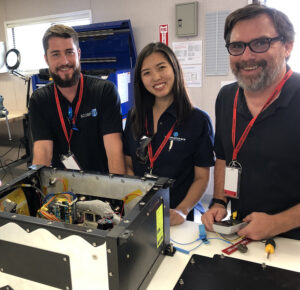Maui company, HNu Photonics LLC, brings NASA-funded cutting-edge technology to the ISS to better understand the effects of living in space on the human body and to develop and manufacture future medical cures in space where there is no gravity to distort DNA and protein molecules.

Members of Scorpio-V, a division of HNu Photonics, who worked on the Mobile SpaceLab include (from left) Dr. Devin Ridgley, Chief Biologist, HNu Photonics/Scorpio-V; Sylvia Loh, Bio Engineer, HNu Photonics/ Scorpio-V; John Meyer, Electronics Engineer, HNu Photonics/Scorpio-V.
On Sunday, February 9, 2020, Northrop Grumman’s 13th commercial resupply mission for NASA, a Cygnus spacecraft on an Antares rocket, is scheduled to launch from NASA’s Wallops Flight Facility in Virginia, and carry the HNu Scorpio-V Mobile SpaceLab to the ISS.
In 2019, HNu Photonics LLC, an award-winning science and technology company based in Kahului, Maui, was the first instrument builder to be awarded a grant from NASA’s Space Biology Program to use the Mobile SpaceLab for its own biological experimentation during a roundtrip mission to the ISS. HNu Photonics was previously awarded a grant from NASA to include its instrument on a Blue Origin launch. Additionally, they have a Space Act agreement with NASA.
Scorpio-V, the space technology biological sciences division of HNu, designed the tissue and cell culturing facility that can perform biology experiments in space without the need for crew operations, for as long as a month. “Scorpio -V’s Mobile SpaceLab, a fully automated microfluidic and imaging platform, will perform the biological experiments on the ISS,” said Principal Investigator Dr. Caitlin O’Connell. “Our team of scientists will design and execute experiments to test the effects of microgravity on neurons and will control and monitor the experiments from Earth.”
O’Connell explained, “As the U.S. and other nations and organizations around the world expand space exploration, it has become imperative to better understand what living in space does to the human body in order to mitigate potential health risks. Furthermore, the neuron studies performed on the ISS with the Mobile SpaceLab are expected to provide additional insights into earth-bound age-related cognition and decline.”
Decades of NASA research on ISS National Laboratory and Shuttle missions have demonstrated that mammalian cell cultures exhibit altered morphology, proliferation, motility, differentiation and often increased oxidative stress when exposed to the microgravity environment. “Thus, physiological dysfunction at the tissue and systemic level is likely a result of altered cellular function, subcellular processes and intracellular communications,” said O’Connell. “Intracellular trafficking of vesicles is a fundamental subcellular process that can significantly alter cellular tissue and systemic processes if impaired in microgravity.”
Through this and subsequent studies, the Scorpio-V team will seek to measure the effects of gravity, or lack thereof, on neuron differentiation, cellular processes, cytoskeletal organization, intracellular communication and overall functionality, to better inform the NASA scientific community about the effects of microgravity on neural and general cellular function.
“This series of investigations may lead to future drug discoveries or therapeutic interventions to attenuate the debilitating effects of microgravity on NASA crew members,” said Dr. Devin Ridgley, Chief Biologist, Scorpio-V. “These therapeutic interventions may also be used to treat neurodegenerative diseases or general cognitive decline for the terrestrial human population.”
Previous studies on earth have demonstrated that disrupted intracellular communication contributes to abnormal physiological processes and that intracellular processes are sensitive to cytoskeletal organization. “It has been well documented that the lack of gravity on-orbit has resulted in a cytoskeletal structural reorganization within a host of adherent mammalian cell cultures,” said Ridgley. “Furthermore, the mechanical environment of stem cells has been shown to dictate the differentiation pathway and the final phenotype of a cell line”
Incorporated in 2006, HNu Photonics is a science and technology company creating cutting-edge technologies and transforming innovative ideas into state-of-the-art products with commercial, scientific and military applications. The focus of the company is renewable energy, defense photonics, specialized optics, and medical imaging technologies. HNu has already introduced revolutionary advances in each of these areas. The company name “HNu” is derived from the physics formula that defines the energy contained in one photon of light (E=h*nu).
HNu founder and CEO, Dan O’Connell, is also dedicated to making Maui 100% solar energy-driven. He has hosted many interns from Maui County high schools, the University of Hawaii (UH) Maui College, and the UH system. Of HNu’s 60 employees, 75% of them are Maui hires. He has personally mentored and provided apprenticeship training to aspiring scientists and to STEM (science, technology, engineering, mathematics) programs.
“HNu brings another honor to Maui County for developing the Scorpio-V Mobile Spacelab, a tissue and cell culturing facility to study human biology on the ISS,” said Leslie Wilkins, Maui Economic Development Board President and CEO. “MEDB applauds HNu for their research to better understand the effects of living in space on the human body. Over the last two decades the number of long-duration spaceflights has increased. Studies have shown the importance of additional research on the astronaut’s’ cognitive and behavioral activities in microgravity.”
HNu has a long-standing relationship with MEDB. They have partnered together on a number of initiatives, including collaboration on the electric vehicle project. MEDB is a 501(c)(3) nonprofit organization dedicated to providing leadership and vision for the responsible design and development of a strong sustainable and diversified economy for Maui County.
